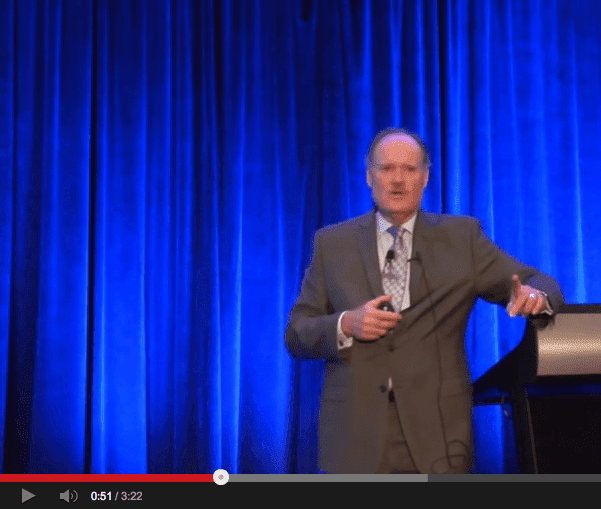NG: So what do you think about the health risk analysis issue? Do you think health analysis should only be given through qualified practitioners?
JB: Well, I think there are two parts to that. Number one is that the focus today on genetic testing is always to be looking for the bad news, the “What’s my disease risk?” I would turn this entire thing around, I would say that’s not the real information – it’s what’s your health opportunity? So, say this is not about relative risk and the gloom and doom model of, “I have a 40% risk of this, and 25% risk of this” and living in fear that you are going to get one of these diseases like the Monte Carlo effect of pulling the big handle of the slot machine.
 Rather, say “Look at these unique characteristics I have that if I can activate these, these are my health characteristics, they will allow me to ward off infection, they will allow me to repair a wound, they will allow me to have good mental function, these are my strengths.” Everyone has genetic strengths, just as everyone has genetic susceptibilities, so why are we always focusing on the disease? I think this is where the real opportunity lies: to bring out the characteristics that give me natural defense and give me the proper repair.
Rather, say “Look at these unique characteristics I have that if I can activate these, these are my health characteristics, they will allow me to ward off infection, they will allow me to repair a wound, they will allow me to have good mental function, these are my strengths.” Everyone has genetic strengths, just as everyone has genetic susceptibilities, so why are we always focusing on the disease? I think this is where the real opportunity lies: to bring out the characteristics that give me natural defense and give me the proper repair.
NG: So, we are not the victims of our genes.
JB: That’s the key. Yes, we can alter the way our genes are read. As I said in my book, our “Book of Life” is encoded in 23 chapters: half of these chapters are written by our biological mother, the other half by our biological father. The stories within each chapter are called our genes, the thousands of stories, not all being read simultaneously. If they were, we’d be a mess, because in every cell in our body is the story for every other cell type at every other age of our life, so we can’t be reading all that Book in every cell all the time, or we’re just going to be a mess.
So that means only selected portions of our Book of Life are being read. And what portion do we want to read? Do we want to read the Greek tragedy stories or do we want to read the bliss love stories? That’s our opportunity individually to figure out: How are we going to design our lives to access the information in the really good stories?
NG: Based on research by myself and some colleagues comparing test results from 23andMe and other labs, as well as cross-comparisons between different companies all interpreting data from 23andMe, there are discrepancies. There is a lack of agreement around standards and parameters used to report SNPs (Single Nucleotide Polymorphisms). There are differences in assessment of relevance, importance, and so forth. What would you say about how to resolve these issues?
JB: This is a new science, it’s new information, and like all new things, it’s in flux. So don’t over-read. It’s just a point on the curve, it’s not the answer-all. What is your answer-all is your (genetic) code. If your code is read correctly, in other words the analysis was done correctly, that will stick with you for the rest of your life, you only need that analyzed one time. The interpretation of the code, however, is going to change remarkably as the science improves. It’s a very robust iterative system and you’ll see new discoveries all the time in the coming years.
NG: At the moment, in the wrong hands, mistakes can be made with the interpretation such as inadvertently treating the SNP rather than the person. So training for healthcare professionals working with the genome data seems important.
JB: Yes, I think with any new technology it should be sifted through by the people who understand the technology and can sift out some of the wild cards. Over time, as people get more comfortable and the group intelligent increases, then the reliance on professionals declines, but I think for the next say 10 years, healthcare professionals are going to be critically important as the conduits to the person to help them not over-react or not to get overly concerned and so forth.
You have to have professionals who are going to provide the service to people in need of a new type of collaborative relationship. And you have to have consumers who are asking for a different set of services. But they have to know the questions to ask. If you don’t know the questions to ask, you’re never going to ask for those services so there will be no reason to provide them.
NG: Any final comment or message for Holistic Primary Care readers?
JB: Up to this point I believe there has been extraordinary commitment, energy and tireless work on the part of holistically-minded practitioners to provide service to their clients and patients, without having a unifying concept as to how their particular efforts are going to fit into the big picture of transformation. I think this big picture of opportunity for transformation is emerging so that their efforts will be multiplied in value. It wont be one patient at a time, it’ll be a multiplicative value as we get the concept that each one of these skills is part of a broader whole of creating this transformation in healthcare based upon this model. So it’s not just a grab bag or smorgasbord of different techniques; acupuncture one day, aromatherapy the next. It’s an integrated construct of how we transform thinking about health and disease.
Holistic Primary Care would like to thank our friends at CAM Magazine, the UK’s leading publication for holistic practitioners, for allowing us to use this interview material which was originally published as a cover story in their July 2014 edition.
END
Niki Gratrix is an internationally renowned, award-winning nutritional therapist and coach who originally co-founded one of the largest complementary and alternative health clinics in the UK. Niki was Director of Nutrition where she formulated the nutrition protocol, trained 5 other therapists and completed over 7,000 consultations. Niki trained at the Institute for Optimum Nutrition in the UK and served as the Vice Chair of the British Association for Applied Nutrition and Nutritional Therapy in 2012-2013. She speaks internationally, writes in a range of health magazines. Niki also has a certificate in NLP (Performance Partnership) and originally got her degree in Economics and International Politics from the University of Warwick, UK. Reach Niki via her website: www.NikiGratrix.com







